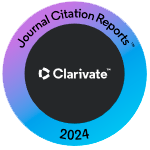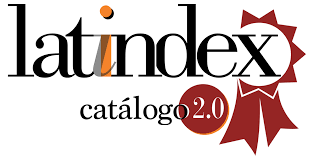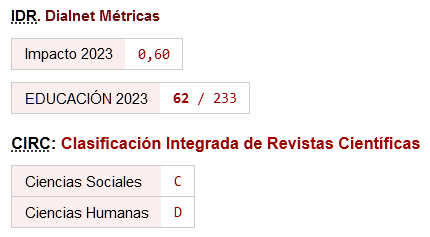Adjustment and evaluation of the competences in the European Higher Education Area
Abstract
En el marco del Espacio Europeo de Educación Superior (EHEA) es necesario diseñar un currículo basado en competencias. En el caso de España la Educación Superior está cambiando hacia el sistema europeo de transferencia de créditos ECTS. Esto supone una nueva adaptación de la metodología y evaluación de la educación y prácticas educativas. El Doble Grado de Trabajo Social y Educación Social de la universidad Pablo de Olavide, Sevilla (España), está adaptando su currículo al sistema de créditos ECTS. Para evaluar la adquisición de competencias de los estudiantes, diseñamos un cuestionario de autoevaluación de las competencias. El coeficiente alpha de Cronbach indicó una alta fiabilidad y consistencia interna del instrumento. El análisis de componentes principales de rotación varimax mostró tres factores que se corresponden con las competencias definidas en el cuestionario: cognitivas, instrumentales y actitudinales. La autoevaluación de competencias conseguidas por los estudiantes se correspondió adecuadamente con los objetivos perseguidos en la asignatura. Los resultados pueden ser un indicador de la viabilidad del uso del currículo basado en competencias en el Espacio Europeo de Educación Superior EHEA.
In the framework of the European Higher Education Area (EHEA) is necessary to design a competency-based curriculum. In the case ofSpainthe Higher Education is changing toward the European Credit Transfer System (ECTS). This supposes a new approach in the methodology and evaluation of the education and learning practices. The joint degree of Social Work and Social Education at the University Pablo de Olavide,Seville(Spain), is adjusting the curriculum to the ECTS. To evaluate the achievement of students’ competences, we have elaborated a self-questionnaire of competences’ evaluation. The coefficient alpha of Cronbach values indicated a high reliability and internal consistency. The principal components analysis with varimax rotation showed three factors that corresponded with the competences defined in the questionnaire: cognitive, instrumental and attitudinal and could be denominated as the self-evaluation profit of the competences by the students. The results can be an indicator of the viability of the use of competency-based curriculum in the EHEA.
Downloads
References
Bricall, J.M. y Bruner, J.J. (2000) Bricall Report [Available in:http://www.crue.org/informeuniv2000.htm]
Caride (2007) Social Pedagogy at the process of European Higher Education Area the Higher Education Area. Review of Social Pedagogy, 14: 11-31.
Dearing, R. (1997). Dearing Report (Higher Education in the Learning Society). Londres: National Committee of Enquiry into Higher Education (HMSO).
Gaspar, M.F., Mota, A. ,F. da ConceiÇao, H.C. y Pereira da Silva, J.A. (2008) A questionnaire for listening to students´ voices in the assessment of teaching quality in a classical medical school. Assessment & Evaluation in Higher Education, 1-10.
Gónzalez, J. y Wagenaar, R. (Eds.) (2003). Tuning Educational Structures in Europe. Final report. Bilbao: Deusto university.
Declaration of Bologna.(1999) Joint Declaration of the European Ministres of Higher Education [Available in: http://www.mec.es/universidades/eees/files/Declaracion_Bolonia.pdf]
March, M. (2007) Social Education in the framework of the European Higher Education Area. Review of Social Pedagogy, 14: 33-58.
MEC (2006). Directrices para la elaboración de títulos universitarios de grado y master, 21 de diciembre de 2006. [Disponible en: http://www.mec.es/mecd
/gabipren/documentos/files/directrices-2006.pdf]
Monereo, C. y Pozo, J.I. (2003). The university at the new educational culture. Madrid: Síntesis.
Nieweg, Michael. R. (2004) Case study: innovative assessment and curriculum redesign. Assessment & Evaluation in Higher Education, 29:2,203-214.
Ortega, J. González, M. Froufe, S. Rodríguez, M.J. y Muñoz, J.M. (2007) study of the professional and academia profit of the social education degree in Castilla-León. Review of Social Pedagogy, 14: 77-94.
Rioja, A. (2007) ¿Hacia qué modelo de Universidad converge Europa? Review of Social Pedagogy, 14: 53-62.
Sambell, K. y McDowell, L. (1998) The construction of the Hidden Curriculum: messages and meanings in the assessment of student learning. Assessment & Evaluation in Higher Education, 23:4,391-402.
Tillema, H.H., Kessels, J.W.M. and Meijers, F. (2000) Competences as buildings blocks for integrating assessment with Instructions in vocational education: a case from The Netherlands. Assessment & Evaluation in Higher Education, 25:3,265-278
UNESCO (1998) World Declaration on Higher Education for the Twenty-first century: vision and action. [Disponible en: http://www.unesco.org/education/educprog/wche/declaration_eng.htm#world%20declaration ]
van der Schaaf, M.F. and Stokking, K.M. (2008) Developing and validating a design for teacher portfolio assessment. Assessment & Evaluation in Higher Education, 1-21.
Yániz, C. y Villardón, L. (2006). Planificar desde competencias para promover el aprendizaje. El reto de la sociedad del conocimiento para el profesorado universitario. Cuadernos monográficos del ICE, num 12.











